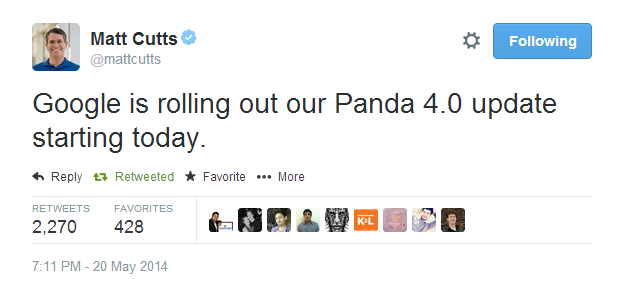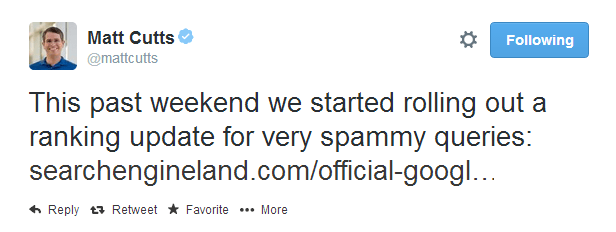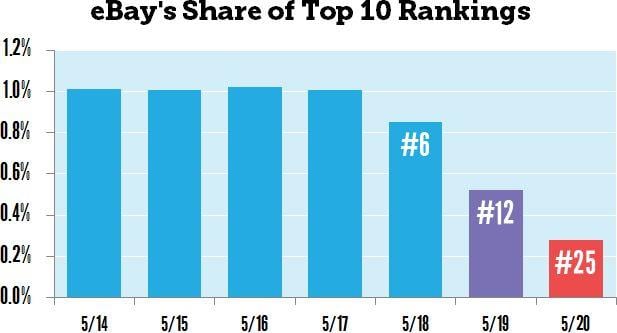Poor eBay – they’re having a pretty bad day. Thanks to Google’s roll-out of Panda 4.0 and the Payday Loan 2.0 update, eBay is suffering a massive loss in organic traffic and rankings. Adding insult to injury, they had to ask all users to change their passwords after a database hack.
Matt Cutts kicked off the SEO hysteria yesterday as he often does, with a tweet:
First released in 2011, Panda is a component of the organic search ranking algorithm designed to weed out low-quality sites, or those with “thin content.” In its initial release, Panda affected approximately 12% of all search queries – by March 2013, Google had refreshed Panda 25 times, making it a constant source of aggravation in SEO circles.
This update is particularly worrisome for webmasters, given that Google had stopped announcing Panda updates/refreshes. At SMX West in March last year, Cutts said Panda would become a rolling, monthly update. Since he actually announced Panda 4.0, this seems to signal a major change to the algorithm – more than just a data refresh.
Cutts’ tweet just an hour after he announced Panda 4.0 confirmed something SEOs had speculated about over the weekend – Google had also started rolling out an update to their Payday Loan algorithm, making it version 2.0.
Payday, first launched in June 2013, is unrelated to Panda or Penguin and targets particularly spammy queries. In the video announcement of that update, Cutts mentioned payday loans and pornography queries as two places they intended to sharpen their focus.
eBay’s Supposed Shift from AdWords to SEO
Last year, eBay published a paper on a “large-scale field experiment” they’d conducted that supposedly conclusively proved that “brand-keyword ads have no short-term benefits, and that returns from all other keywords are a fraction of conventional estimates.” In short, the gist was that AdWords doesn’t work for companies as big as eBay, and paid search is only marginally useful for acquiring new customers. You can read more about their findings and methodology in this summary at Harvard Business Review.
As I pointed out at the time, eBay’s failure to make paid search work for them had nothing to do with AdWords and everything to do with their poorly managed campaigns and atrocious misuse of AdWords features like Dynamic Keyword Insertion:
eBay’s asleep-at-the-switch AdWords management style not only made them look stupid to searchers – those irrelevant ads also cost a brand a ton of money. Their failure to implement even the most basic of paid search best practices, like using negative keywords so you’re not appearing in queries for vomit, made their research completely unreliable.
The implication of this report was that eBay was going to drop AdWords as a channel and focus its efforts on organic search engine optimization.
So how did that work out for them?
eBay Gets Slammed by Panda 4.0
Harvard Business Review predicted that Amazon, Walgreens and other major internet retailers would soon follow eBay’s lead and ditch AdWords. If you’re doing SEO, you get that prime SERP placement for free, right?
Here’s the problem: In SEO, past performance is no guarantee of future results, and eBay is learning this in spades today. It looks like their “strategy” revolved around “doorway pages” and thin content – exactly the kind of search spam that Google has been trying to eradicate from the SERPs.
Dr. Pete at Moz has already taken an early look into eBay’s organic rankings, in light of the confirmation of the two Google updates confirmed/announced yesterday.
Oh noes! The main eBay subdomain has fallen completely out of the ‘Big 10,’ Moz’s list of the ten domains with the most real estate in the top 10. It’s a huge drop, considering the historical data available.
Moz’s data is showing that eBay lost around 75% of their terms from page one. They regularly crawl around 10k “head terms” – higher volume keywords.
What I’m seeing in my own research is that they’re not even ranking competitively on 80% of their non-branded “long tail keyword searches” (millions of more specific keyword searches) anymore:
The preceding figure illustrates for a random sampling of non-branded, long tail keywords eBay was previously targeting, 80% of them are no longer on the first page, despite relatively low competition for these highly targeted keywords.
Why eBay Got Hit: Thin Content, Doorway Pages
When you search for specific products and see an organic search result, chances are, it’s leading you to a doorway page – pages on eBay with very little content, like this one:
The actual product listing pages consistently have three features:
- eBay’s own, internal search results
- Ads – text ads, display ads and PLAs
- Internal links to other product results pages
They’re also employing aggressive internal linking on super-long-tail keywords in their footers:
You can continue to refine your query within eBay, following search results pages, internal links and ads, and drilling down into specific products, but you aren’t going to find much content on the way.
I’m surprised that Google has allowed these shenanigans to go on for so long – especially now that they have product listing ads that offer a better experience for this kind of thing:
By knocking eBay’s product listings pages out of the organic rankings, Google is forcing eBay to use product ads to stay in front of those searchers seeking information about specific types of products.
It would be easy to say that profit is the sole motive here, but this is actually good for users too. eBay’s “strategy” of pushing out millions of doorway and internal site search pages was spam by anyone’s definition. For commercial queries, Google shopping ads offer the most useful customer experience.











0 Comments